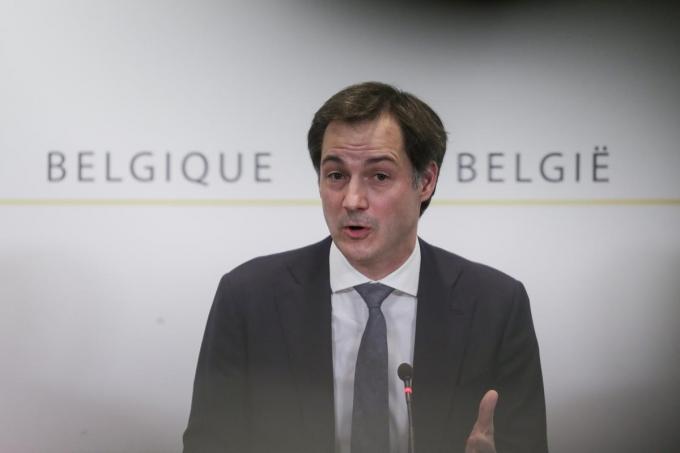Belgium is taking a number of strict additional measures to combat the rapidly rising coronavirus figures, announced Prime Minister Alexander De Croo during a press conference on Wednesday.
"The figures have risen sharply, and hospitals are wondering how long they can keep doing this," De Croo said. "This evolution is one that we see in our country, but also in our neighbouring countries, where it also leads to strict new measures."
"This was a difficult decision to make, but I am convinced that any other decision would be even more difficult," he added. "In our hospitals, people are starting to postpone more and more necessary care. Nobody wants that."
"The Consultative Committee has therefore opted for the short pain: one could call it an Easter pause, of four weeks with measures imposed across various sectors," De Croo said.
These measures will apply from the evening of Friday 26 March, and will remain in place for at least four weeks.
From Monday, classes at all levels of education (primary and secondary, part-time arts education, and higher education) will be suspended until 2 April. Kindergartens can remain open. In secondary schools, planned exams can still go ahead. Schools are still expected to fully re-open again from 19 April.
From Saturday, non-medical contact professions, such as hairdressers and beauty salons, have to close again.
Non-essential shops can only receive clients by appointment. If necessary, a maximum of one additional person can join, but only if both are part of the same household. Home deliveries and click-and-collect remain possible, if there is no physical contact and no entry into the shop.
People will only be allowed to meet outdoors in groups of four, (not counting children under 12 years old) and no longer in the so-called "outdoor bubble" of ten people.
Youth camps and extra-curricular activities for schoolchildren are still possible, but only during the Easter holidays, in limited groups of maximum ten young people, and without overnight stays.
The number of participants for static demonstrations will be limited to 50.
Teleworking remains compulsory, and there will be "additional controls and stricter penalties" for companies who do not follow the rule.
The ban on non-essential travel will also remain in force. "This is not the time to travel abroad. Additionally, we will increase the controls at the borders during the Easter holidays," De Croo said.
The current curfew remains in place, and non-essential journeys within Belgium will remain allowed.
"We have been able to keep the virus on a plateau for months, and we will be able to overpower this third wave as well," De Croo said. "There is also hope: the vaccinations are going faster and faster. By the end of May, all over-65s and at-risk patients should have received their first shot subject to delivery."
"The virus has brought us back down to earth in recent days. This is a lesson in humility. For policymakers, for experts, and for all of us," he said. "It is in our nature to make plans, but unfortunately, it is in the nature of the virus to mess them up. But our goal remains a summer of freedom."
"I do not think that anyone needs to be convinced of the seriousness of some of the indicators," said Flemish Minister-President Jan Jambon. "I fully realise that this is a blow to many people. People had hoped that we could put these restrictions behind us."
"These are strong measures, but they are limited in time," he said. "From now until 25 April, we have no choice but to make that effort again."
"We have no choice. This is the task we all have together now. We have done it very well in the past, and we can do it again," Jambon said.
"There is light at the end of the tunnel: the vaccinations are working. The vaccination centres are running at full capacity," he added. "Let the deliveries come in large doses. The more vaccines are delivered, the more we can administer."
"This is not an easy situation," said Federal Health Minister Frank Vandenbroucke. "The virus has become more dangerous. We are seeing a lot more younger people admitted to hospital, and we are also seeing them going to intensive care more quickly."
"So, a very quick and strong so-called 'cooling-off period' was absolutely necessary. We know we can do it, we have already proven that before," he said.
"The essence is and remains: fewer contacts," Vandenbroucke added, pointing to the measure of one so-called 'cuddle contact' outside the household, emphasising that children under 12 also count as such a contact.
"We are returning to the rules that you can be outside with no more than four adults, unless you have a family of five or six of course," he said.
"The fact that the figures have gone up again in recent days and weeks is not a question of blame," Vandenbroucke said. "We are not going to point the finger. We all have to go through this difficult period together."
"This is necessary if we are to reopen the schools after the Easter holidays, and that should be our priority," he said. "If you see the figures, it would have been better if we had made this decision sooner, but it is not too late."
Maïthé Chini & Lauren Walker
The Brussels Times

